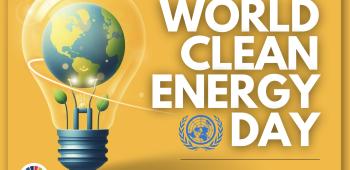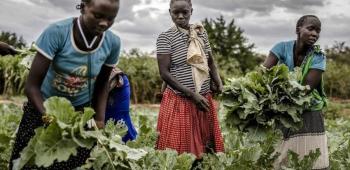Energy
Description
In 2015, the UN General Assembly adopted the 2030 Agenda for Sustainable Development, which include a dedicated and stand-alone goal on energy, SDG 7, calling to "ensure access to affordable, reliable, sustainable and modern energy for all". Energy lies at the heart of both the 2030 Agenda for Sustainable Development and the Paris Agreement on Climate Change. Achieving SDG7 will open a new world of opportunities for millions of people through new economic opportunities and jobs, empowered women, children and youth, better education and health, more sustainable, equitable and inclusive communities, and greater protections from, and resilience to, climate change. The Global Roadmap for Accelerated SDG 7 Action resulting from the High-level Dialogue on Energy 2021 provides a guide for collective action on energy across sectors.
DESA supports these efforts by providing secretariat services for intergovernmental discussions on energy, by conducting and facilitating relevant policy analysis, and by engaging in the required capacity building.
DESA serves as the Secretariat for UN-Energy.
DESA convenes the SDG7 Technical Advisory Group.
As the Secretariat of UN-Energy, DESA facilitates the Energy Compacts.
| Title | Type | Date |
|---|---|---|
| Agenda (French) | Logistics | 9-Apr-2003 |
| Aide Memoire (English) | Logistics | 9-Oct-2005 |
| Logistic Note on Capacity Development for Mainstreaming Energy (SDGs), Targets and Indicators into… | Logistics | 10-Dec-2014 |
| Aide Memoire (French) | Logistics | 9-Oct-2005 |
| List of Participants | Logistics | 9-Apr-2003 |
| Logistic Note on Capacity Development for Mainstreaming Energy (SDGs), Targets and Indicators into… | Logistics | 10-Dec-2014 |
| Aide Memoire | Logistics | 9-Apr-2003 |
| Programme | Logistics | 9-Oct-2005 |
| Aide Memoire | Logistics | 9-Jun-2005 |
| Programme | Logistics | 9-Jun-2005 |
| Hotel reservation form (Spanish) | Logistics | 19-Dec-2014 |
| Aide Memoire | Logistics | 10-Mar-2007 |
| Programme | Logistics | 10-Mar-2007 |
| Agenda (English) | Logistics | 2-Jun-2003 |
| Summary on Capacity Development for Mainstreaming Energy (SDGs), Targets and Indicators into Statistical… | Meeting reports | 24-Feb-2015 |
Pagination
Pagination
Milestones
-
January 2006 CSD-14, Thematic Cluster: Energy for SDCSD-14 convened in May 2006 and focused on the importance of energy use for the achievement of sustainable development, but also on its role as one of the main contributors to air pollution, atmospheric problems and greenhouse gas emissions. Therefore, the Commission highlighted the need to further develop cleaner energy methods, technologies as well as to ensure access to modern energy services for cooking and heating and agreed on the need to provide a judicious mix of energy from all sources in order to meet the rising global energy demand with optimal efficiency, with advanced, cleaner fossil fuel technologies playing an important role.
-
January 2002 UN EnergyUN-Energy is the mechanism created by the United Nations for inter-agency collaboration in the field of energy. It was established in order to identify and ensure coherent strategies and a consistent approach in the area of energy and to contribute to the efforts made at national level towards the transition to sustainable energy.
-
January 2002 JPOI (Chap. 2.9)The Johannesburg Plan of Implementation (JPOI) addresses energy in the context of sustainable development. The JPOI calls, inter alia, for action to: (1) improve access to reliable, affordable, economically viable, socially acceptable and environmentally sound energy services; (2) recognize that energy services have positive impacts on poverty eradication and the improvement of standards of living; (3) develop and disseminate alternative energy technologies with the aim of giving a greater share of the energy mix to renewable energy and, with a sense of urgency, substantially increase the global share of renewable energy sources; (4) diversify energy supply by developing advanced, cleaner, more efficient and cost-effective energy technologies; (5) combine a range of energy technologies, including advanced and cleaner fossil fuel technologies to meet the growing need for energy services; (6) accelerate the development, dissemination and deployment of affordable and cleaner energy efficiency and energy conservation technologies and (7) take action, where appropriate, to phase out subsidies in this area that inhibit sustainable development.
-
January 2001 CSD-9 (Decision 9/1)At CSD-9, countries agreed that stronger emphasis should be placed on the development, implementation, and transfer of cleaner, more efficient energy technologies and that urgent action was required to further develop and expand the role of alternative energy sources.
-
January 1992 Agenda 21 (Chap. 9 B.1)Agenda 21 highlighted the fact that current levels of energy consumption and production are not sustainable, especially if demand continued to increase and stressed the importance of using energy resources in a way that is consistent with the aims of protecting human health, the atmosphere, and the natural environment.
Pagination
- Previous page
- Page 2




